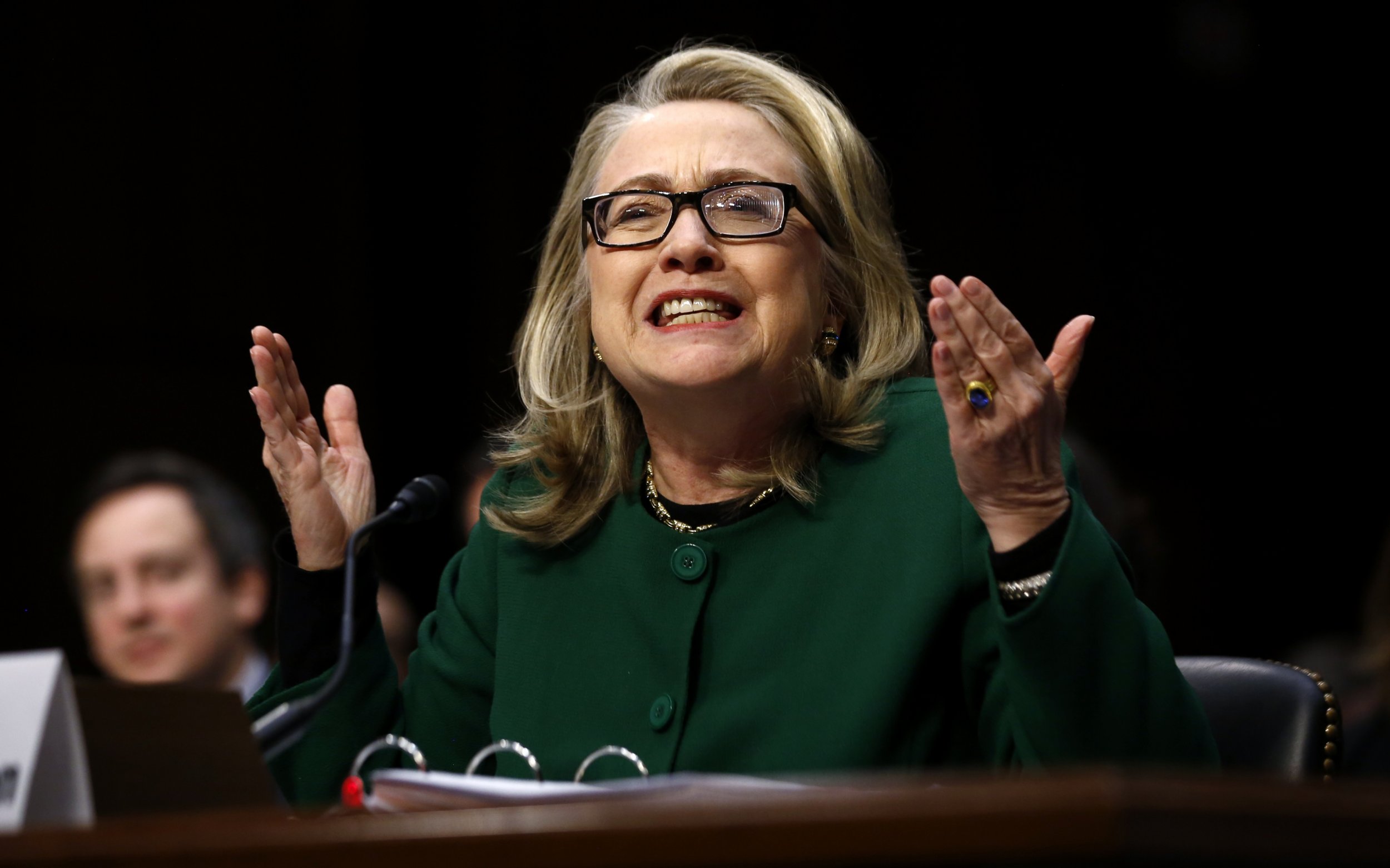
It's seems safe to say that Hillary Clinton will likely be the next president of the United States. She's got the most money and will go into the election with her party more or less behind her. Donald Trump, meanwhile, still has to convince the GOP, and a large chunk of the electorate, that he's not Hitler.
Senator Lindsey Graham may have changed his mind on Trump, but other prominent Republicans have not: former Presidents George W. and George H.W. Bush, to name two, plus a smattering of Republican also-rans and other elected officials are refusing to endorse Trump, even as he pivots toward Clinton, their bitter enemy. Not to mention the other issues plaguing Trump's campaign, namely his abysmal favorability ratings among women, blacks and Latinos—the worst for any presidential candidate since they started measuring these things. So, while it's not a sure thing that Clinton will win this thing, it's what you might call a safe bet.
The future, of course, is never set in stone, and Clinton could lose. If she does, it'll more than likely not be because of something Trump said or did—though he will do and say a lot in the coming months, and much of it will no doubt be ugly. Rather, Clinton's downfall, like all great downfalls, will originate with her.
Clinton has a lot of baggage. That's normal when you've been in politics as long as she has, and especially when you've built your career as a deal-maker—someone unafraid to make imperfect arrangements if they advance her core causes. But some of that baggage will weigh her down. Here is a look at a handful of blasts from the past that could transform "I'm With Her" into (inarticulate wail).
Benghazi. The ultimate conservative Twitter meme: Who can forget B-E-N-G-H-A-Z-I? In 2012, four American diplomats were killed by Islamic extremists in Benghazi, Libya. The reason for their deaths wasn't immediately clear—the media initially reported that what started as a spontaneous protest outside a U.S. diplomatic compound-cum-CIA outpost—a common event in that part of the world during the Arab Spring—metastasized into an attack on the building. Later, it was discovered that the attack was actually planned and that a) the State Department didn't see it coming and b) didn't fortify the compound to withstand it.
Both of these things would be bad on their own, but the political right went online and took what was already a tragic event and made it worse by trying to spin the media's reporting of the events as a deliberate attempt at obfuscation by the Obama administration and, in particular, Clinton's State Department. There were other sins that they tried to lay at Clinton's feet as well. For instance, right-wing pundits got the idea that Clinton's State Department ordered a group of soldiers stationed near the compound to "stand down"—something that didn't happen. But the line made it into film director Michael Bay's fictionalized account of the event, 13 Hours, anyway. And Senator Rand Paul of Kentucky suggested that the CIA's presence in Benghazi might mean that the agency was secretly selling arms to Libyan or Syrian rebels, another claim for which there was no evidence.
Smelling blood, congressional Republicans soon formed a select committee to investigate the events leading up to the attack, as well as the Obama administration's response. Democrats were quick to accuse the Republicans of using taxpayer dollars to fund a witch hunt against Clinton. The committee has yet to unearth any wrongdoing, but Clinton's testimony during one hearing yielded a sound bite that's sure to appear in attack ads down the line. Asked by Wisconsin Senator Ron Johnson about the motive for the attack, Clinton snapped. "Was it because of a protest or was it because of guys out for a walk one night and decided they'd go kill some Americans? What difference—at this point, what difference does it make?" Clinton said. The right interpreted the line to mean that the lives of four Americans were worth very little to Clinton. The left, and Clinton, said that she meant bringing the attackers to justice mattered more than their motives. At any rate, look for Benghazi to come back in a major way as the November election approaches. At this point, it seems unlikely that the committee will unearth anything new, but if it does, it could shift the course of the election.
The Monica Lewinsky affair. A tale as old as time: Boy meets girl, boy and girl get married, boy becomes president of the United States, boy meets younger girl, younger girl performs oral sex on boy in the Oval Office, younger girl tells her best friend about it, her best friend tells book agent Lucianne Goldberg, Goldberg tells Newsweek reporter Michael Isikoff (whose superiors held the story from publication) so she tells right-wing hatchetman Matt Drudge, who blasts it everywhere.
The sordid saga of Bill Clinton's dalliance with a 22-year-old White House intern captivated the nation and crystallized the narrative that surrounds the Clintons still: Bill, the philandering smooth talker, and Hillary, who will endure any humiliation in the pursuit of power. This ground has been trod and retrod, but don't expect that to stop Trump from rehashing the entire episode, up to and including Clinton's impeachment trial for lying under oath. While the Clintons would surely prefer that this episode of their history stay in the past, Trump's huge unfavorable ratings with women mean that painting Clinton as supportive of—or as an enabler of—a cheater might be a winning strategy for him. Of course, he will probably look like a bully, haranguing her for something over which she had no control, but then it's clear Trump isn't afraid to look like a bully.
Bill Clinton's sexual misconduct allegations. The Lewinsky scandal aside, the potential first gentleman is no stranger to allegations of extramarital affairs; three women have accused the former president of sexual misconduct. Juanita Broaddrick, a former nursing home administrator from Arkansas, claimed in 1999 that Clinton had raped her two decades before. Clinton's attorneys refuted that claim, and the former president refused to comment. In 1998, Kathleen Willey, a former White House volunteer, said that Clinton had groped her and forcibly kissed her in 1993. And Paula Jones, a former employee of the state of Arkansas, where Clinton was governor, said that he sexually harassed her.
None of these complaints resulted in criminal trials against Bill Clinton, but his wife's handling of them can and will likely be used against her. At a recent campaign event, she told supporters that "every survivor of sexual assault deserves to be heard and believed." An audience member asked Clinton whether her husband's accusers should be afforded the same rights, to which Clinton replied that they should be believed until evidence brings their accounts into question. It was as solid an answer as Clinton could give. But that's the rub—her husband has been accused of sexual misconduct, which makes it difficult for her to insist that those who claim to be victims of sexual assault should be believed by default while not believing those who accuse her husband.
Vince Foster. The body of Vince Foster Jr., a deputy White House counselor in the early days of Bill Clinton's presidency, was discovered in a public park on July 20, 1993. His death was ruled a suicide, but the entirely baseless conspiracy theory that the Clintons had Foster killed—for reasons that were never entirely clear—has lingered since his death. Longtime Clinton ally and former conservative David Brock has claimed that the conspiracy theories surrounding Foster's death are encouraged by, and originate from, the GOP.
This being a fairly old and now somewhat obscure Clinton scandal, nobody was really talking about it since Clinton announced her run for the presidency. Then along came Trump, telling reporters Foster's death was "very fishy" and saying the conspiracy theories about his death should be taken seriously.
Emailgate. The most recent Clinton scandal involves her questionable use of a private email server to conduct official State Department business. The New York Times first reported that Clinton had used a private server and a personal email address instead of the one issued to her by the State Department. The newspaper also reported that Clinton's use of a private email server violated rules for government employees. It turns out the second part wasn't true—while there are rules that require government employees to use their work emails, those rules didn't go into effect until after Clinton left State.
The right, as well as members of the press, seized on the issue, and many argued that Clinton had purposefully used her personal email to keep reporters from being able to file Freedom of Information requests about her time at State. But the scandal grew when investigators discovered 65 emails classified as "secret" or a higher category. The fact that Clinton was sending classified intelligence over her personal email server, which wasn't as well protected as government servers, was troubling. However, investigators later found that the emails Clinton had sent that were classified as "secret" were either misclassified or had been classified after Clinton had sent them, essentially clearing her of any official wrongdoing. Still, the episode outlines a familiar pattern for Clinton critics, with some saying that she plays by the rules when they suit her and ignores them when they don't—sometimes to the detriment of the American people. The FBI is still investigating, and, depending on what the agency finds, "Emailgate" could go from a minor annoyance for Clinton to a major one.
Speeches. Clinton was paid $500,000 for two speeches by Wall Street investment bank Goldman Sachs. It's a fact that Bernie Sanders loves to remind voters of, as it fits perfectly into the narrative that surrounds her: Publicly, Clinton criticizes Wall Street's excesses and promises new regulations, but privately she takes the money in exchange for a few kind words, her critics argue. And Clinton's refusal to release transcripts of those speeches creates a natural suspicion that there's something in them she doesn't want voters to see. The Clintons left the White House with much personal debt; giving speeches was one way they got back into the black. But the characteristic Clinton caginess surrounding the content of those speeches has some wondering if they might have something to hide.
Uncommon Knowledge
Newsweek is committed to challenging conventional wisdom and finding connections in the search for common ground.
Newsweek is committed to challenging conventional wisdom and finding connections in the search for common ground.
About the writer
Taylor is a general assignment reporter for Newsweek where he writes about U.S. politics, crime and courts, religion, marijuana law, ... Read more
To read how Newsweek uses AI as a newsroom tool, Click here.








